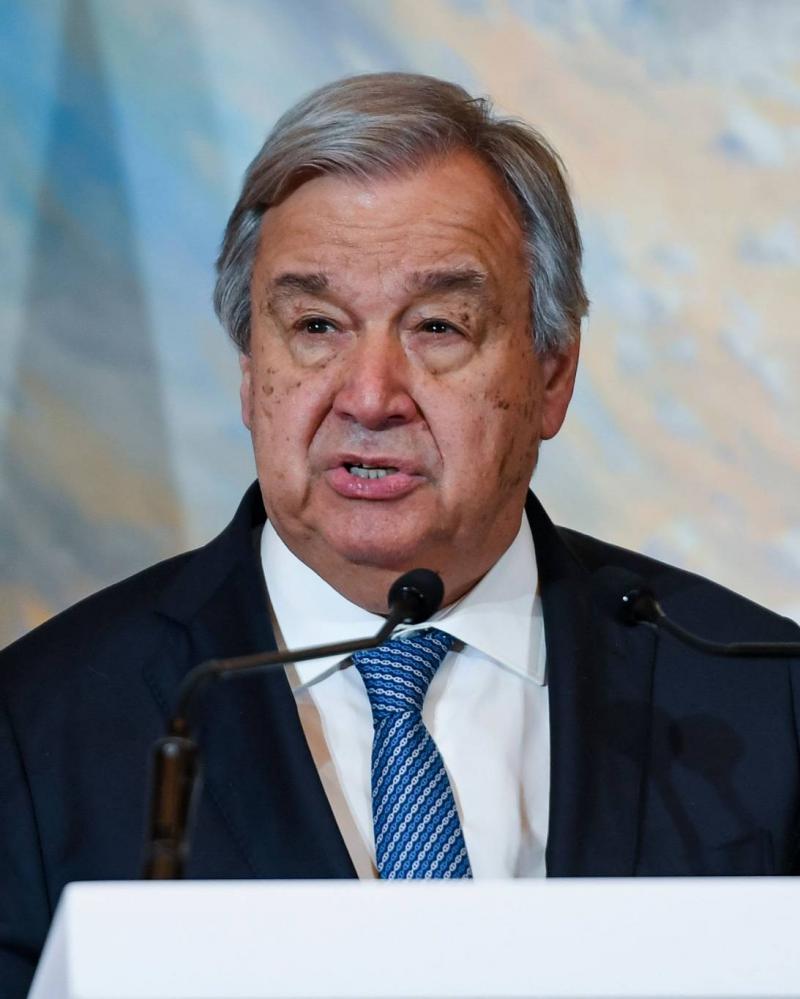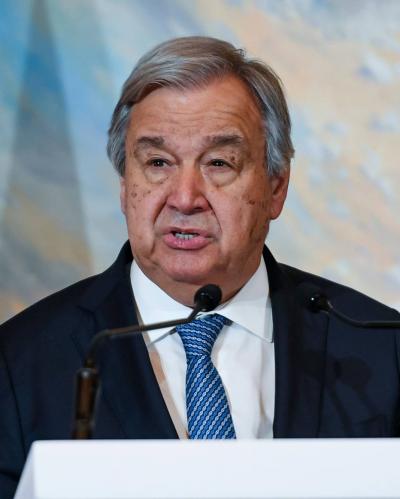UN Secretary-General António Guterres issued his annual report on the implementation of Resolution 1701 based on the submission from the UN Special Coordinator for Lebanon, Joanna Fronciska, covering the period from February 21 to June 20, 2023, upon which Guterres based his report. The report consists of 23 pages and includes 91 points, including an introduction that provides a comprehensive assessment of the implementation of Resolution 1701, which was issued in 2006, indicating that "both the Lebanese and Israeli parties have not yet fully fulfilled their obligations under Resolution 1701 and no progress has been made towards achieving a permanent ceasefire between Lebanon and Israel."
The report noted, "On April 6, 24 rockets were launched from the areas of the sameyah, the malakiya, and Zbaqin crossing into the southern part of the blue line. On April 7, the Israeli army carried out airstrikes on three sites near the Rashidiya Palestinian refugee camp." It mentioned that "construction and engineering works being undertaken by the Israeli army near the blue line have sparked tensions on several occasions in Aita ash-Shab, Hawla, and Israeli and Lebanese forces pointed their weapons at each other near Maroun al-Ras and Aitaroun, which was repeated in Blida… incidents that occurred in the occupied Shebaa Farms also ignited tensions. On May 7, the temporary force observed a tent more than 30 meters in size set up south of the blue line near Bastra, and later noted individuals crossing the blue line from the north to reach the tent. On May 30, surveillance cameras were installed near the tent. On June 17, a second tent was noted, and the interim force requested the Lebanese army to remove both tents."
The report also addressed "near Kfarshouba where individuals threw stones and violated the blue line from the north, while Israeli forces displayed their firearms and used tear gas."
Israel continues to violate the airspace, noting "Israel's continued violations of Lebanese airspace in breach of Resolution 1701 and Lebanese sovereignty, recording 131 violations with a total of 187 hours and 7 minutes of flight, approximately 85 percent of violations were carried out by remotely piloted aerial vehicles, 5 percent by fighter jets, and 10 percent by unidentified vehicles." The temporary force recorded 609 land violations committed by Lebanese in civilian clothing crossing into the southern part of the blue line, including 372 violations by herders and farmers and 237 violations by other individuals. The Lebanese army crossed the blue line near Majidiyah, Bastra, and Marouhin on nine occasions, mostly to defuse tension. The forces observed an Israeli excavator crossing the blue line 11 times near Markaba, Mais al-Jabal, and Arab al-Louiza.
He added: "To help keep the area between the blue line and the Litani River free of unauthorized armed individuals and unauthorized equipment and weapons, the temporary force maintained close coordination with the Lebanese army, with 16 permanent checkpoints and 79 temporary checkpoints and carrying out an average of 489 rocket launch countermeasures monthly. Following the rocket launch incident on April 6, the mission increased its rocket launch countermeasures from an average of 12 daily operations to 30 operations from April 7 to April 24. The temporary force recorded 303 instances of unauthorized weapons in its operational area, including 285 instances of hunting weapons. The force recorded 18 instances of light machine guns, assault rifles, and long-range rifles, and once registered unidentified weapons and three instances of pistols. Eight instances of weapons not classified as hunting were noted in the shooting range near Zbaqin, and since March, it reported the presence of two yellow flags carrying what appeared to be Hezbollah symbols erected at the shooting range in Zbaqin, and the force informed the Lebanese army of all these violations."
Regarding the "UNIFIL" patrols in the south, "the temporary force maintained a high intensity in its operations and a visible presence, carrying out 14,034 operational activities monthly, of which 6,193 were vehicle, air, or foot patrols. While respecting the freedom of movement of the temporary force in most cases, the mission faced several restrictions that hindered its movement. The most dangerous incident of that type occurred on April 16 near Mais al-Jabal when 17 masked individuals, two of whom were armed with pistols belonging to the force, attacked. One of the masked individuals hit the patrol leader, injuring his head, and as the patrol attempted to leave, two individuals damaged the vehicle's windows and tires with an axe, injuring three peacekeepers lightly. Other incidents posed risks to the safety and security of UN peacekeepers, including instances where weapons were directed at them. On March 22 and 31, and June 6, 18, and 20, the Israeli army aimed weapons, including a tank cannon, in an incident on March 31 towards Lebanese monitoring teams near Yaroun, Kfarshouba, Blida, and Marouhin."
In the observations section, the UN Secretary-General's report stated, "The current political situation in the country is unsustainable, and I call on all stakeholders to quickly act in a spirit of consensus to elect a new president for the benefit of the Lebanese people and to support the stability of the country. The continued vacuum in the executive branch with a caretaker government managing the affairs of the country undermines Lebanon's ability to respond to the challenges it faces."
He expressed concern "over the continued incidents and displays of force near the blue line, including firing into the air, using smoke bombs, flashbangs, pointing weapons towards the other side, and throwing stones. Clashes between the Israeli army and the Lebanese army, as well as between individuals and the Israeli army, could lead to escalation with potentially grave consequences. To reduce potential hot spots, I encourage both sides to use the tripartite formula established by the temporary force to resume discussions on the remaining contentious points along the blue line."
The Secretary-General added, "I am still deeply concerned about the presence of unauthorized weapons in the area between the Litani River and the blue line, and the continued lack of necessary support to access shooting ranges is unacceptable. The establishment of infrastructure north of the blue line, while not a violation of Resolution 1701, threatens the freedom of movement of the temporary force, as evidenced by recent incidents. I am alarmed by Hezbollah conducting military training on May 21, involving armed fighters in military attire carrying heavy weapons; this is a violation of Resolution 1701, and I condemn Hezbollah and other non-state armed groups' retention of unauthorized weapons not under state control, as well as their repeated acknowledgment of this."
He continued, “I urge the Lebanese government once again to take all necessary measures to ensure that no weapons in Lebanon are outside the control of the Lebanese state or authority, including the full implementation of relevant provisions of the Taif Agreement and Security Council resolutions 1559 and 1680, which call for the disarmament of all armed groups in Lebanon. I reiterate my call to address the elements of Resolution 1701 that remain unimplemented and the issue of national defense strategy. In this regard, the implementation of previous decisions made within the framework of national dialogue remains crucial, particularly regarding the disarmament of non-Lebanese groups and the dismantling of facilities belonging to the Popular Front for the Liberation of Palestine - General Command and the Fatah Intifada organization."
**Regarding the Town of Ghajar:**
The Secretary-General addressed the issue of the town of Ghajar, stating that "Israel's continued occupation of the northern part constitutes an ongoing violation of Resolution 1701 that must end, and I regret the lack of progress on the Shebaa Farms issue."
He concluded by urging the Lebanese government "to adhere to its policy of disassociation in accordance with the Baabda Declaration of 2012 and calls on all Lebanese actors to refrain from participating in the Syrian conflict and other conflicts, condemning any movement of combatants or transfer of military equipment across Lebanon's borders with Syria."
Regarding the issue of refugees, he stated that "Lebanon's efforts to protect refugees are unique in scope, and I continue to appreciate the notable hospitality displayed by the Lebanese people. It remains critically important to have a strong and unified response addressing the increasing needs of refugees and the local communities hosting them, including the provision of adequate funding. In this regard, determining the status of all arrivals since 2015 within data exchange arrangements is an important step. I am extremely concerned about the rising anti-refugee rhetoric undermining the protection of refugees in Lebanon and affecting social stability in the country. I urge Lebanese authorities to work vigorously to defuse this rhetoric to prevent any aggravation of social tensions. I also call on Lebanese authorities to ensure consistent application of legal and procedural guarantees and to uphold the principle of non-refoulement."




